|
|
|
Sort Order |
|
|
|
Items / Page
|
|
|
|
|
|
|
| Srl | Item |
| 1 |
ID:
131895
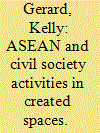

|
|
|
|
|
| Publication |
2014.
|
| Summary/Abstract |
The Association of Southeast Asian Nations (ASEAN) has recently made numerous commitments to engage civil society organizations (CSOs) in its governance practices. However, the opportunities created offer limited means for CSOs to contest policy as a result of strict controls over who can participate and the forms of participation permitted. Activists have consequently pursued their agendas outside of spaces sanctioned by ASEAN through 'created spaces,' such as conferences organized parallel to official summits. However, this form of political participation has limited potential to influence official processes because despite its independence, these activities are still structured in relation to ASEAN practices. The ineffectual nature of CSO advocacy despite ASEAN's people-orientated shift has been documented, however explanations for this trend remain limited. This article applies the modes of political participation framework that acknowledges the role of intergovernmental organizations in structuring spaces for civil society participation and, in doing so, shaping the contribution that CSOs can make. Through an examination of the regulations and practices that govern CSO participation in both ASEAN-sanctioned and independent spaces, it argues that spaces for CSO participation are structured to prevent CSOs from contesting policy, suggesting that ASEAN's shift to widen participation is directed towards legitimating its reform agenda. Hence, ASEAN's claim of becoming 'people oriented' must be considered in recognition of the limiting effect its engagement practices have on CSOs' ability to advance alternative agendas.
|
|
|
|
|
|
|
|
|
|
|
|
|
|
|
|
| 2 |
ID:
118018


|
|
|
|
|
| Publication |
2013.
|
| Summary/Abstract |
Carbon offsets produced from terrestrial (land-based) emissions reduction projects are a contested frontier of carbon market expansion. Experiments in legislating for and producing terrestrial offsets that come under the title REDD+ have met heated opposition. However, a political consensus about the desirability and feasibility of carbon offsets from avoided deforestation and various land-management practices has slowly emerged. How do terrestrial carbon offsets gain legitimacy in the face of contestation and compelling evidence that creating carbon commodities from land ecosystems is an elusive commodity fiction? It seems that a quiet compromise is emerging over the (re-)commodification of land through carbon trading vis-à-vis the broader process of legitimating marketized climate policy. This paper offers a political-economic analysis of state-led efforts to legitimate a market for land carbon sinks in Australia and the Asia-Pacific region. The dynamics of legitimation and contestation play out as an iterative 'double movement'.
|
|
|
|
|
|
|
|
|
|
|
|
|
|
|
|
| 3 |
ID:
172159
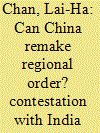

|
|
|
|
|
| Summary/Abstract |
This article argues that China’s Belt and Road Initiative (BRI) can be understood via the lens of regional ordering, whereby China attempts to redefine the shared goals and values for the region of Eurasia and to socialise regional states into the new values in order to have their consent to its leadership. The success of this strategy would then depend, to a large extent, on how its target regional audience reacts to the order-remaking strategy and practices. Taking an ‘eye of the beholder’ perspective, this article focuses on Indian perceptions of China’s order-remaking strategy in South Asia. It posits that India uses the ‘debt trap diplomacy’ narrative to delegitimise China’s infrastructure investment activities based on state capitalism, which have been perceived as a move to upend the status quo and challenge New Delhi’s traditional leadership in the region. To counter China’s growing influence, India is networking with other like-minded countries to promote a ‘free and open Indo-Pacific’ through groupings such as the Asia-Africa Growth Corridor, the Quad, Malabar exercises, and increasing political and economic bonds with the ASEAN countries. A serious contest over order between China and India in the Indian Ocean is looming on the horizon.
|
|
|
|
|
|
|
|
|
|
|
|
|
|
|
|
| 4 |
ID:
173178
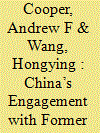

|
|
|
|
|
| Summary/Abstract |
In recent years many former heads of foreign governments have visited China, appearing at various forums, conferences, and other events. China’s engagement with these former leaders may appear to be a form of public diplomacy, but even more importantly it has been a strategy of political legitimation adopted by the Chinese Communist Party. Based on an original database of hundreds of cases, we provide a systematic analysis of the visits of former foreign leaders to China and of their role as external validators for the party-state and its policy initiatives, particularly the Belt and Road Initiative. By shedding light on the Party’s search for external consent and support, we seek to fill a significant gap in the literature, which tends to focus narrowly on the domestic sources of legitimacy and domestic strategies of legitimation.
|
|
|
|
|
|
|
|
|
|
|
|
|
|
|
|
| 5 |
ID:
179323
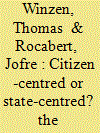

|
|
|
|
|
| Summary/Abstract |
As a result of the spread of International Parliamentary Institutions (IPIs), international organisations face crucial questions of representational design. We introduce a distinction between citizen-centred and state-centred IPIs in international organisations (IO). Drawing on original data, we show that, even though parliaments might seem likely to foster citizen representation in the international realm, they in fact often follow state-centred representational designs. We further find that citizen-centred IPIs are a near exclusive phenomenon of a few, democratic regional integration projects. Given the prevalence of state-centred representational designs, we conclude that IPIs’ potential to represent different cross-border communities, concerns, and conflict lines than intergovernmental IO bodies remains institutionally limited. IPIs are thus unlikely to challenge these bodies in similar ways as often observed in the relationship between the European Parliament and the European Union's Council of Ministers.
|
|
|
|
|
|
|
|
|
|
|
|
|
|
|
|
| 6 |
ID:
185523


|
|
|
|
|
| Summary/Abstract |
This article presents findings from research conducted in Long Beach, California on the history, motives, and functions of the Cambodian People’s Party Youth Organization (CPPYO), a network of Cambodians outside the country who support Cambodia’s long-time ruling party, the Cambodian People’s Party (CPP). Officially, the CPPYO, headed by Cambodian Prime Minister Hun Sen’s son, Hun Manet, was created to promote the current government and to provide political options for Cambodians living abroad. However, many Cambodians in the Long Beach area see the CPP’s presence in the US as invasive and as a threat to their autonomy. To understand how the CPPYO functions in Long Beach, we make use of Gerschewski’s three pillars of authoritarian stability1 and Glasius’ framework for identifying extraterritorial authoritarian practices.2 We conclude that the CPPYO is primarily a strategy for repressing opposition abroad, but that it also contributes to the ruling party’s legitimacy through the participation of Long Beach Cambodian Americans, who accept the CPP’s authoritarian control as a condition for participating in Cambodia’s socioeconomic system. This study contributes to a growing body of research interested in identifying and interconnecting the various legitimation processes, strategies, and practices developed by autocracies to stabilize rule at home and abroad.
|
|
|
|
|
|
|
|
|
|
|
|
|
|
|
|
| 7 |
ID:
179288
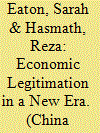

|
|
|
|
|
| Summary/Abstract |
Autocrats typically seek public support on the basis of economic growth-promotion and redistribution policies, and China is no exception. As important as these factors are for authoritarian resilience, we argue that economic legitimation is a more complex phenomenon than has previously been acknowledged. Beyond improvements in material well-being, citizens form judgements about the state's effectiveness in carrying out a variety of economic roles beyond growth promotion and they also care about the fairness of these market interventions. In this study, we use original survey data collected in late 2015 and early 2016 to evaluate Chinese citizens’ perceptions of two economic roles of the state that have been hotly debated in recent years: state ownership and market regulation. We find that while citizens view the ideas of state ownership and interventionist regulation in a generally positive light, suggesting a broad level of agreement in Chinese society about what economic functions the state ought to perform, perceptions of how the state actually carries out these roles are more mixed. Our results show that the urban young are especially inclined to critical evaluations, raising the question of how the Chinese Communist Party's legitimation strategy will fare under conditions of inter-generational value change.
|
|
|
|
|
|
|
|
|
|
|
|
|
|
|
|
| 8 |
ID:
187733
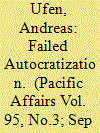

|
|
|
|
|
| Summary/Abstract |
Malaysian Prime Minister Najib Razak’s systematic strategy of autocratization backfired. This paper is based on a model of three pillars of authoritarian regimes. It traces the different strategies and measures employed to weaken the opposition and shows that major survival strategies were prone to frequent shifts. At the beginning of his tenure, Najib depicted himself as a reformer, and refined some forms of repression. The regime scrapped central coercive tools such as the Internal Security Act, but later replaced them with kindred, yet ineffective measures. Co-optation was more centralized and “money politics” expanded. The widespread and unprecedented usage of patronage resulted in corruption, which fundamentally destabilized the regime. Legitimation was modified since 2013 to a more Malay-centric and Islamist discourse. Because of this shift, legitimation eroded among ethnic and religious minorities. The prime minister’s legitimacy shrank due to corruption scandals. This paper helps gauge the lacking complementarity of the pillars and the failures of an authoritarian regime in crisis, which is important also with a view to political developments in Malaysia since 2018.
|
|
|
|
|
|
|
|
|
|
|
|
|
|
|
|
| 9 |
ID:
179856
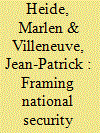

|
|
|
|
|
| Summary/Abstract |
This essay investigates justifications for the “necessity” of official secrecy, by tracing and structuring the rationales underlying it. Justifications will be investigated through the case of “national security secrecy,” a prominent example of official secrecy. While the literature generally treats “national security secrecy” as unidimensional, this analysis demarcates several distinct rationales. Specifically, three justifications for national security secrecy are identified: the logic of crisis demanding the suspension of normal democratic processes (threat frame); the need for enabling and enhancing governance (effectiveness frame); and the delegation to and protection of decision makers (elite governance frame). The paper illustrates possible frictions, overlaps, and synergies between different rationales for national security secrecy, thus broadening the existing conceptualization away from transparency and secrecy as direct opposites. It further contributes to ongoing research on national security secrecy from a frame analysis perspective, thus linking theories, justifications, and practices of secrecy.
|
|
|
|
|
|
|
|
|
|
|
|
|
|
|
|
| 10 |
ID:
069838
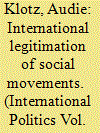

|
|
|
| 11 |
ID:
158727


|
|
|
|
|
| Summary/Abstract |
Human rights violations by international organisations (IOs) are a possible side effect of their growing authority. Recent examples are the cases of sexual exploitation by UN peacekeepers and violations caused by IMF austerity measures. In response, IOs increasingly develop safeguards to protect human rights from being violated through their policies to regain legitimacy. We argue that this development can be accounted for by a mechanism we call ‘authority-legitimation mechanism’. We test this theoretical expectation against ten case studies on UN and EU sanctions policies, UN and NATO peacekeeping and World Bank and IMF lending. Next, we demonstrate inductively that the authority-legitimation mechanism can evolve through different pathways, depending on which actors get engaged. We label these pathways legislative institution-building if parliaments in member states put pressure on their governments to campaign for human rights safeguards in IOs, judicial institution-building if courts demand human rights safeguards, like-minded institution-building if civil society organisations, middle powers and IO bodies with little formal power push for human rights safeguards, or anticipatory institution-building if IOs adopt such safeguards from other IOs without having violated human rights themselves. Finally, we argue that which of these pathways are activated and how effective they are depends on specific conditions.
|
|
|
|
|
|
|
|
|
|
|
|
|
|
|
|
| 12 |
ID:
190174
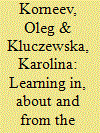

|
|
|
|
|
| Summary/Abstract |
Examining the European Union’s (EU) engagement with Central Asia since the early 1990s, we see an increased commitment to context sensitivity. Arguably, in order to design ‘better’ interventions, the EU needs to know more about this region. This article explores three means of EU learning: in the field – through EU officials’ first-hand experience of working at EU Delegations in Central Asia; about the field – through programmed channels of external expert knowledge, and in particular think tanks; and from the field – during institutionalized consultations with multiple local actors, such as academics, journalists and non-governmental organizations. It is argued that despite this complex learning infrastructure, EU knowledge production on Central Asia has a predominantly performative character. Rather than leading to changes in its relations with Central Asia, new knowledge produced by the EU aims at legitimizing this organization’s pre-existing frameworks of engagement and practices of interactions with the region, and substantiating existing policy priorities.
|
|
|
|
|
|
|
|
|
|
|
|
|
|
|
|
| 13 |
ID:
160515
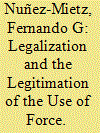

|
|
|
|
|
| Summary/Abstract |
Recent works on the role of argumentation in international politics have enriched our understanding of the discursive construction of international legitimacy. Many scholars have recognized the pervasiveness and privileged status of legal claims. Building on these insights, I advance the proposition that the international legitimacy of the use of force has legalized. Legalization implies that successful (de-)legitimation depends on the strategic use of international law, and that alternative legitimacy discourses (such as morality) have been marginalized and play a negligible role in the construction of legitimacy. Thus, the use of force is legitimate to the extent that it conforms to international law. I test this “legalization thesis” against the “hard” case of NATO's intervention in Kosovo in 1999. By revisiting the arguments used by state representatives, I show that, as expected in a legalized legitimacy system and contrary to what has become common knowledge about this case, legitimacy was gained through, not despite, international law. I analyze NATO's strategy of legitimation in detail and reconstruct it as a set of seven strategic moves, all of them appealing exclusively to the international legal discourse.
|
|
|
|
|
|
|
|
|
|
|
|
|
|
|
|
| 14 |
ID:
140839
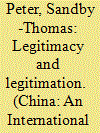

|
|
|
|
|
| Summary/Abstract |
The “puzzle” of why the Communist Party of China (CPC) remains in power has produced a number of competing and complementary explanations. Of these, legitimacy has gained much attention in recent years. While largely convincing, the Weberian-influenced approach, with its focus on economic growth and nationalism, is unable to explain a number of incongruities in contemporary China. Consequently, this has provoked a turn towards empirical methods. Again, though highly informative, these methods also suffer shortcomings, not least whether they are measuring legitimacy. Given this, this article proposes the concept of legitimation to complement these existing approaches for the purpose of enhancing our understanding of why the regime remains in power.
|
|
|
|
|
|
|
|
|
|
|
|
|
|
|
|
| 15 |
ID:
072115
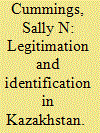

|
|
|
|
|
| Publication |
2006.
|
| Summary/Abstract |
This article analyzes Kazakhstan's contested process of nation- and state-building through a closer examination of the links between legitimation and identity. A wider Weberian emphasis on how the elite relates itself to the broader relationship between rulers and ruled illuminates the difficulties Kazakhstan's elite has encountered in providing both a collective identity and one of self. This complex symbiotic relationship between self-legitimation, legitimation and identification is explained in terms of the economy, polity and perceptions of the Soviet order.
|
|
|
|
|
|
|
|
|
|
|
|
|
|
|
|
| 16 |
ID:
156886
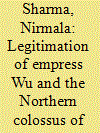

|
|
|
| 17 |
ID:
193134
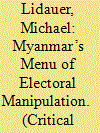

|
|
|
|
|
| Summary/Abstract |
One decade after Myanmar’s military regime organized non-competitive elections that unexpectedly commenced a period of political reforms, the military leadership upended this transitional period with a coup based on a narrative of electoral fraud. Cancelling the November 2020 election results which had confirmed the voters’ preferences for civilian rule, the military has begun organizing fresh elections while concurrently leading a war against the population. Building on Schedler (2002) and the debate on authoritarian elections, this article analyses the military’s contemporary menu of electoral manipulation as a comprehensive set of intertwined strategies. It integrates the analysis of various technical elements of the authoritarian electoral process that are often only looked at in isolation. The article deconstructs the military’s election-related narratives as self-legitimation in a region where authoritarian elections are the norm. Despite considerable efforts to forge conditions in their favor and create an aura of legitimacy, however, Myanmar’s military does not appear very imaginative in this undertaking, but employs a retrograde toolbox in a brutal manner. Whether this strategy is successful will not depend on the authoritarian leaders’ skills alone, but also on recognition from domestic, regional and international audiences which the junta’s performance seeks to achieve.
|
|
|
|
|
|
|
|
|
|
|
|
|
|
|
|
| 18 |
ID:
153609
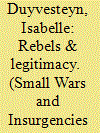

|
|
|
|
|
| Summary/Abstract |
This introduction to the double special issue on the theme of rebels and legitimacy aims to set out the parameters for the discussion. It looks at legitimacy as a concept and at legitimation as a process. To date most of the literature on legitimacy has focused on the state. However, rebel groups such as insurgents, terrorists, warlords and guerrillas have all had claims, and continue to claim, legitimacy as well. How and when are these rebels seen as legitimate actors? Existing suggestions of rebel legitimacy focus heavily on state models of social order and the social contract. This first contribution discusses how to conceptualize legitimacy and how to make it operational. A two-pronged approach, borrowing heavily from Max Weber, is proposed. Legitimacy is investigated based on beliefs and belief systems about what is considered legitimate. This is combined with practices whereby legitimacy is enacted, copied and emulated by the population the rebels claim to represent.
|
|
|
|
|
|
|
|
|
|
|
|
|
|
|
|
| 19 |
ID:
183000
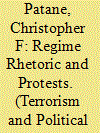

|
|
|
|
|
| Summary/Abstract |
This paper discusses the role that a regime’s rhetoric—negatively framed public statements directed at domestic targets and audiences—plays in the suppression of protest. Although much work has examined how state repression affects mobilization, this has remained isolated from other repressive strategies. I argue that a regime’s public statements serve as a non-violent alternative to state repression, that they can complement the use of force, and condition the consequences of state repression. This behavior serves to bolster the regime’s public image and rally domestic support, while undermining the complaints of protesters. Relying on a monthly event data analysis, I test the expectation that increased levels of regime rhetoric leads to lower levels of mobilization. Findings indicate that while rhetoric and repression alone increase mobilization, a campaign of regime statements used in conjunction with repression leads to a decrease in protest activity.
|
|
|
|
|
|
|
|
|
|
|
|
|
|
|
|
| 20 |
ID:
138849
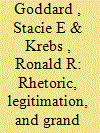

|
|
|
|
|
| Summary/Abstract |
This introductory framing paper theorizes the role of legitimation—the public justification of policy—in the making of grand strategy. We contend that the process of legitimation has significant and independent effects on grand strategy’s constituent elements and on how grand strategy is formulated and executed. Legitimation is integral to how states define the national interest and identify threats, to how the menu of policy options is constituted, and to how audiences are mobilized. Second, we acknowledge that legitimation matters more at some times than others, and we develop a model specifying the conditions under which it affects political processes and outcomes. We argue that the impact of legitimation depends on the government’s need for mobilization and a policy’s visibility, and from the intersection of these two factors we derive five concrete hypotheses regarding when legitimation is most likely to have an impact on strategy. Finally, we explore who wins: why legitimation efforts sometimes succeed in securing public assent, yet at other times fall short. Our framework emphasizes what is said (the content of legitimation), how it is said (technique), and the context in which it is said. We conclude by introducing the papers in this special issue, revisiting the larger theoretical stakes involved in studying rhetoric and foreign policy, and speculating about how changes in the technologies and sites of communication have, or have not, transformed legitimation and leadership in world politics.
|
|
|
|
|
|
|
|
|
|
|
|
|
|
|
|
|
|
|
|
|